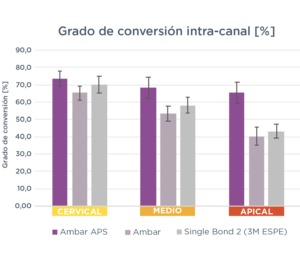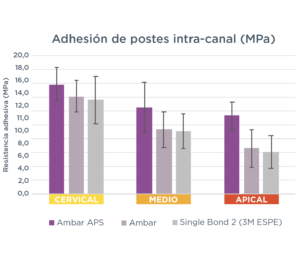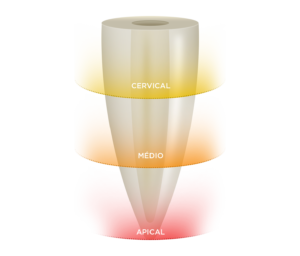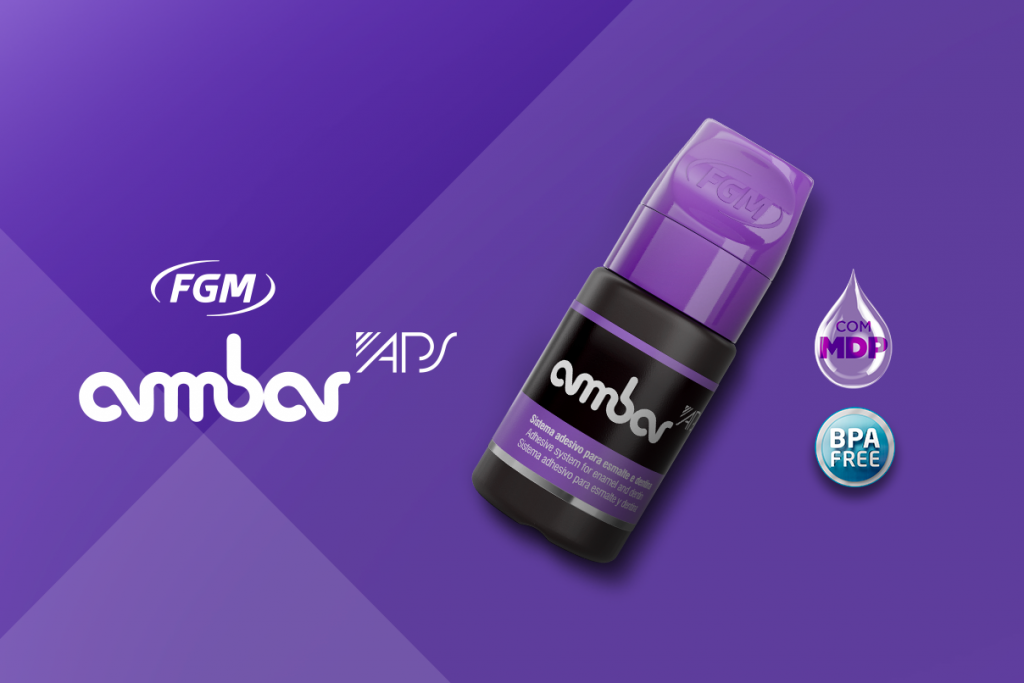WAY BEYOND A COLORLESS ADHESIVE SYSTEM
Does the color of the adhesive interfere, in a relevant way, in the color of thin veneers? Yes, of course it does and it is something to take into account if you want highly esthetic results.
The table below, for example, which is part of a scientific study, shows the efficacy of Ambar APS. Values above 3.3 are clinically imperceptible.


Adapted from: Jr OFO, Kunz PVM, Filho FB, Correr GM, Cunha LF, Gonzaga CC. Influence of Pre-Curing Different Adhesives on the Color Stability of Cemented Thin Ceramic Veneers. Braz Dent J. 2019; 30(3): 259-265.
Ambar APS and Ambar Universal APS adhesive systems are virtually colorless. The APS technology – an FGM exclusive – applies a very low concentration of camphorquinone, which eliminates the yellowish aspect, guaranteeing a colorless adhesive – without any color difference between before and after photoactivation.
The result, for sure, is way better if compared to adhesives with a high concentration of the substance. That is why it is important for the dentist to pay attention to the fact that camphorquinone-dependent adhesives use a co-initiator that may undergo oxidation with time and get yellowish in the future.
Another advantage of the Ambar APS and Ambar Universal APS adhesive systems is the lower concentration of solvents, favoring the aesthetics of restorations in the long term – around the margins of the adhesive restorations in general and in extra-thin veneers – besides minimizing the operator-risk factor considering that the APS technology, as far as solvents are concerned, offers:
- Reduction of the chance of an operator mistake in the phase of solvent removal = > lower risk of affecting the adhesive conversion rate.
- Lower susceptibility to hydrolytic degradation = > alters the color of the adhesive, which may change the aspect of thin and translucent ceramics and the restoration margins
- In face of the presence of excess solvent (badly evaporated) it degrades and is eliminated with time leaving spaces susceptible to sorption, or rather, leaving micro-spaces for water absorption, changing light propagation and leading to greying and increased translucency (look of delayed internal stain). That occurs because the refraction rate of the object is changed.
Moreover, Ambar adhesive systems with the APS technology count on high conversion rates and long-lasting adhesion, guaranteeing excellent performance in varied dentin humidity levels – an attribute that can only favor the professional that wants to deliver only the best results for the professional and for the patient.
Thanks to the APS technology, the professional can take maximum advantage of the lighting source of their photoactivating equipment, even in challenging situations, without compromising the conversion rate. All in all, with APS, there is a better use of the light of your photopolymerizing equipment for an excellent conversion rate and maintenance of the performance of the adhesive system concerning both esthetics and function.


The high conversion rate of the apical third reveals the potential of the APS system in the polymerization of the adhesive.


The intracanal adhesion has always been a challenge for adhesives and cements. With Ambar APS, it was possible to reach very high levels of adhesion along the whole conduct, even in the apical portion, which represents the area with the highest adhesive difficulty.
Source: Loguercio AD, et al., UEPG-PR, 2018.


Ambar APS showed the best result in the apical region, a critical region due to the difficulty for it to be reached by the light.
The first BPA free dental adhesive in Brazil: more safety for the patient
Ambar adhesives are free of BIS-GMA and their derivates, or rather, they are free of monomers with aromatic rings passible of pigmentation by sub-products. It is also BPA free.
Joining the trend towards BPA-free materials, FGM Dental Group, a pioneer in the manufacture and sales leader of dental whiteners in Brazil and in Latin America, is the first Brazilian dental product manufacturer to introduce to the market products with that feature (BPA free), such as the Vittra APS composite and the adhesives for enamel and dentin Ambar, Ambar APS and Ambar Universal APS. It is worth pointing out that the substance has been proved by several studies to be prejudicial to one’s health, causing problems such as behavioral and memory disorders and a greater risk of early puberty, cancer, diabetes and cardiovascular diseases.
Although dental research shows that, presently, the BPA released from the degradation of restorations and sealants is under the maximum level considered safe, it is understood that safety parameters may be changed with time and there are other sources of BPA an individual may be exposed to.
Therefore, it seems logical to assume that “Certainly, groups at higher risk to endocrine disruptors, such as pregnant women and children, and individuals who are more conscious about the theme will prefer BPA free materials, it being one less preoccupation factor,” notes professor Rodrigo Reis, doctor in odontology, Master of Science in restorative dentistry and biomaterials, graduate in implantology).
Ambar APS and Ambar Universal APS Adhesive Systems:
- Performance
- Esthetics
- Stability
- Less sensitive to the Operator Factor
Get to know more on the use of the product in the video:























